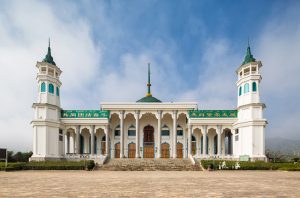Qudong Mosque in Yongping County, Dali

Chinese Name: 永平曲硐清真寺
Chinese Pinyin: Yongping Qutong Qingzhensi
English Name: Qudong Mosque in Yongping County, Dali
Type: mosque
Recommended Visiting Hours: 1-2 hours
Location: Qutong Village, Bonan Town, Yongping County, Yunnan
Qutong Mosque
Qutong Mosque(曲硐清真寺) is situated in Qutong Village, which is an important place of the Southwest Silk Road. Qutong Village is the largest Muslim village in west Yunnan, enjoying a population of over 7000. The Qutong Mosque enjoys the history of hundreds of years, entitled as the model mosque and cultural relics protection unit of Yongping County.
How to get to Qutong Mosque?
Qutong Mosque is located in Qutong Village, Bonan Town of Yongping County(永平县博南镇曲硐村). There is no buses to Qutong Mosque directly. 5 km from Yongping County, travelers can rent a car or drive from Bonan Town to Qutong Village.
History
The Qufu Mosque was first built under the Nanshan Mountain in Qutong. Before the Xinhe River was diverted, the river went straight down from Ximen Street. The whole village was divided into two halves. The river was separated by a small river. Because of the inconvenience, there was a big worship temple and a small worship temple.
After the re-construction of the new river in the late Qing Dynasty, the population of Qufu increased, the housing area expanded, and the villages were connected. In the second year of the Republic of China (AD 1913), the two masques merged into one and built the existing worship mosque. The mosque is composed of majestic gates, main halls and Xuanli Building (called worship building). It is divided into two inner and outer courts. The inner courtyard has a main hall, a worship hall, a north and south hatchback, and the outer courtyard has a north-south wing and a gate. In the “Cultural Revolution”, the worship hall was destroyed.

In 1982, the local Hui people raised funds to renovate the main hall. In 1988, Qutong Mosque was listed as a county-level key cultural relics protection unit. In 1990, with the help of government, mosque raised more than 200,000 yuan, and newly built a building called the Bailou(拜楼) and the Damenlou Building(大门楼). The construction of the worship building adopts the combination of ancient and modern styles, architecture of Chinese and Western, with both the architectural form of the ancient Roman church and the antique ethnic characteristics. The County Islamic Association is set up in Qutong Mosque.
What to See
When entering the gates of the mosque, the six marble veneered square pillars stand in front of the building. The Bailou is divided into four floors, and the top of the first floor is made of a turquoise tile to form a pagoda-shaped arc. When you climbed onto the steps to the middle walkway, you will feel refreshed. A solemn chapel stands in front of you, with the green trees along the way and rooms for learning scriptures. On the second floor, there is a broadcasting room for preaching the teachings and reciting the Quran. The meeting hall and reading room are situated on the third floor. Setting foot on the steel ladder, we can see a delicate and chic hexagonal pavilion here. We will have a panoramic view of the whole plain. In the early morning, when the rooster does not announce, the bells and chanting voices of the worship welcome the new day.
Architectural Features
- Main Prayer Hall: The mosque features a traditional Chinese architectural style with Islamic design elements. The main prayer hall is spacious and accommodates worshippers during daily prayers and religious ceremonies.
- Minaret: A minaret is prominently featured in the mosque’s architecture, serving as a symbol and also as a structure for the call to prayer (Adhan).
- Courtyard: The mosque’s courtyard provides a serene environment for community activities, including educational programs and social gatherings.
Useful Travel Tips
When the weather is fine in Dali, the sunshine is heated, and ultraviolet light is strong. People should avoid direct sunlight, and the sun hat preparation is required during outdoor activities, a pair of sunglasses will make you comfortable in the trip.
Cultural Significance
Qudong Mosque plays a crucial role in preserving and promoting Islamic traditions and cultural heritage in Yongping County. It serves as a center for religious education, cultural exchange, and community cohesion among the local Muslim population.
Educational and Cultural Activities
The mosque hosts various educational programs, such as Quranic studies, Arabic language classes, and lectures on Islamic history and ethics. These activities contribute to the intellectual and spiritual development of the community.
Community Events
Throughout the year, Qudong Mosque organizes festivals, religious ceremonies, and community events that foster unity and solidarity among Muslims in Yongping County. These events are also opportunities for cultural exchange with visitors and non-Muslim residents.
Muslim Travel Tips
For Muslim travelers planning to visit Qudong Mosque:
- Prayer Facilities: The mosque provides prayer facilities for daily prayers. Visitors should check prayer times and join congregational prayers for a meaningful spiritual experience.
- Dress Code: Dress modestly and respectfully when visiting the mosque. Women are encouraged to cover their heads with a scarf, and both men and women should ensure their attire reflects respect for the religious setting.
- Etiquette: Follow mosque etiquette, such as removing shoes before entering, maintaining quietude during prayers, and respecting the sanctity of the prayer hall and courtyard.
- Local Cuisine: Explore Halal food options around the mosque. Yongping County offers a variety of local Halal dishes that reflect the region’s culinary traditions.
Getting There
Qudong Mosque is accessible from Yongping County and Dali City by public transportation, taxis, or private vehicles. It is advisable to plan the visit in advance, considering local transport schedules and routes.
Qudong Mosque stands as a cultural and spiritual landmark in Yongping County, welcoming visitors to experience the rich heritage of Islam in Yunnan Province.















